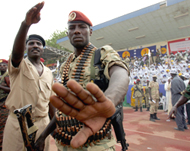Disillusioned Chadians stay at home
Voters had to leave their daggers at the door and armed soldiers were on guard as Idriss Deby cast his vote in Chad’s presidential elections.

When the president and first lady finally pulled up in four armoured Hummers, officials from the ruling party orchestrated a series of chants from hundreds of local people.
However, the queues in the capital disappeared almost before the dust from his convoy settled and some of the crowd left without voting.
Throughout N’Djamena, election officials reported low turnout; in the morning, journalists had a difficult time finding a voter who was not member of the military or a civil servant.
Since the 20 main opposition parties decided to boycott the election, citing dissatisfaction with the registration process and the lack of an independent electoral body, President Deby is widely seen as the favourite to win.
Ghetto life
Last year he changed the constitution to allow himself to run for a third term.
Isaak Akrina Darfouh, 25, said: “This is not democracy, it’s like having to eat something you don’t like.”
 |
|
Oil revenues have been spent on |
He has a masters degree in business but has been unable to find a job since leaving university; his wife works in the market to support their two children.
“This country is a mess,” he said, gesturing at the rubbish filled gutters and dangling power lines.
“There is no electricity here, this is a ghetto … our future is in jeopardy and this president is using the future generations fund [from the country’s oil revenues] to buy weapons.”
In the shade around him, about 20 youths nodded their heads; none of them intended to vote, they said.
Oil supply
There has been much debate this year over right of the government to spend its oil revenues as it pleases.
Chad began exporting oil in 2003, thanks to a pipeline built with a loan from the World Bank.
In return,the country promised to spend a proportion of the revenues of on poverty alleviation and put aside 10% in a “future generations fund” to be spent after the oil ran out.
Although so far returns have been modest – around 250,000 barrels per day – President Deby has argued that he needs the cash to buy weapons to fight a rebellion in the east.
 |
|
Few ballot boxes were even a |
Several rebel groups are fighting the president and the largest two announced an alliance this week.
An attack on the capital two weeks ago left hundreds dead, although a threat to prevent the elections from taking place failed to materialise.
The streets of the capital, N’Djamena, were tense but calm on voting day, with many voters remembering the havoc from 1979, when 12 rebel factions battled for the city.
In the older sections of town, buildings still have bullet holes.
Kriga Mbang-Djina, a student, said: “I just want peace for my country.” Healthcare and schooling for her children were also concerns, she said.
Low turnout
Despite the country’s oil wealth, most Chadians will not live to live to see 45; with an average wage of less than a dollar a day, few can afford education.
Transparency International rates the country alongside Bangladesh as the most corrupt in the world.
By the time that polls had closed, few ballot boxes were even a quarter filled.
Mahamet Hissein, the secretary-general of the ruling party, insisted that the turnout had trumped the 30% claimed for the referendum on constitutional change last year.
“It was hot, people have learnt to vote in groups during the day so they don’t queue up,” he said.
However, the claims were met with widespread scepticism among those who had witnessed the election.
Some polls had even closed early due to a lack of voters.
Although the government does not have to announce results for two weeks, few expect it will take that long to count the votes.